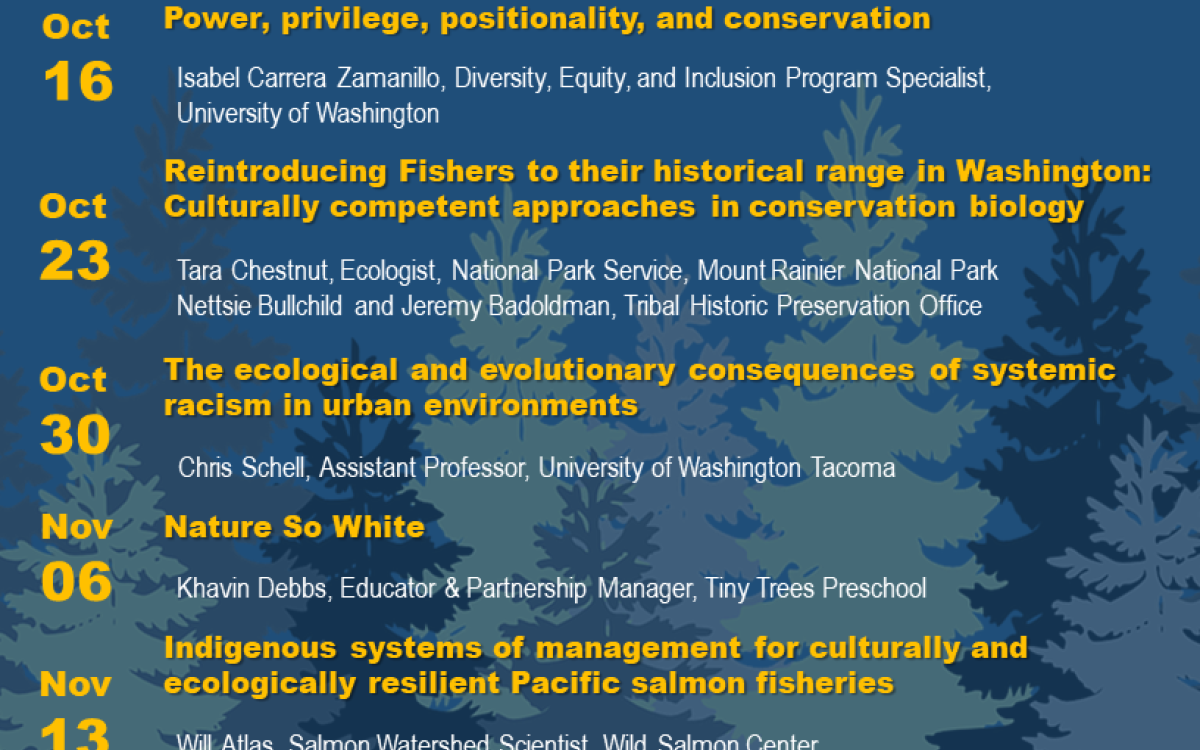At a glance
Conservation and equity are intrinsically intertwined topics that have often been treated as two separate areas of study.… Read full summary
- Funding received
- 2020-2021
- Mini
- Awarded
- $1,000
- Funding partners
-
- Services and Activities Fee (SAF)
- Website & social links
Conservation and equity are intrinsically intertwined topics that have often been treated as two separate areas of study. Science, conservation, and management not only benefit from having a diversity of stakeholder perspectives informing projects, but the effects of management and scientific policies extend more broadly than the ecosystems they impact. This seminar will highlight the importance of cross-cultural collaboration and competency in science. In this seminar series and course, we will investigate a series of research projects or conservation initiatives that have the unifying theme of 1) having a conservation-oriented objective, 2) being led by or integrally involving indigenous groups or underserved communities throughout the project, and 3) diversifying the participants in the process leading to the successful implementation of a conservation or research policy. Talks will have a scientific backbone while also highlighting the diversity of participants, the equity of these stakeholders in planning, barriers that exist to participation, and how this format of engagement led to conservation success. This seminar fits with the proposed goal of increasing communication and cultural competency among faculty, staff, and students across UW.
Project lead
Staci Amburgey
Description
Conservation and equity are intrinsically intertwined topics that have often been treated as two separate areas of study. Science, conservation, and management not only benefit from having a diversity of stakeholder perspectives informing projects, but the effects of management and scientific policies extend more broadly than the ecosystems they impact. This seminar will highlight the importance of cross-cultural collaboration and competency in science. In this seminar series and course, we will investigate a series of research projects or conservation initiatives that have the unifying theme of 1) having a conservation-oriented objective, 2) being led by or integrally involving indigenous groups or underserved communities throughout the project, and 3) diversifying the participants in the process leading to the successful implementation of a conservation or research policy. Talks will have a scientific backbone while also highlighting the diversity of participants, the equity of these stakeholders in planning, barriers that exist to participation, and how this format of engagement led to conservation success. This seminar fits with the proposed goal of increasing communication and cultural competency among faculty, staff, and students across UW.
This class/seminar will meet once per week (10-11:20am on Fridays). The seminar will be the first 30 minutes of the time slot. A guest speaker or speakers (when collaborators are available) will present a research or conservation-driven example, followed by an open discussion regarding practices, insights, and lessons learned. Each talk will be advertised and open to the broader UW community through public announcements (see attached example advertisement), weekly reminders, and dissemination of the class website through channels such as the College of the Environment and departmental listservs. Additionally, enrolled participants will be assigned a reading selected by the guest speaker and the project lead to generate informed questions and discussions. These readings will also be sent out via the public announcement of the seminar and posted on the course website so that anyone who wishes to can view the material and read along. Each week’s talk will be hosted via Zoom where it will be recorded but also will be live-streamed via the SAFS YouTube channel. The YouTube channel will allow for closed captioning of the video in real-time and increased security (talk information can be shared widely without fear of Zoom-bombing). The speaker will answer questions solicited via email beforehand or on YouTube. The remainder of class and discussion will be limited to just enrolled participants (21 students) afterward.
Objectives
By the end of the seminar, attendees will:
- Become more familiar with diversity, equity, and inclusivity (DEI) practices and foundational vocabulary
- Increase their cultural competency, particularly with respect to local groups and topics in the Pacific Northwest
- Be better able to identify stakeholder perspectives when discussing conservation and management projects
- Be better able to discuss the complexities of conducting research in a multicultural landscape
- Become more familiar with conservation and management topics, particularly in the Pacific Northwest
Schedule
- Antiracism in Conservation. David Muñoz, Penn State University - October 9th
- The role and dimensionality of identity in environmental behavior. Isabel Carrera Zamanillo, University of Washington - October 16th
- Cultural competency in fisher reintroduction in the Washington Cascade Mountains. Tara Chestnut, Mt Rainer NP, Nettsie Bullchild and Jeremy Badoldman, Tribal Historic Preservation Office - October 23rd
- Title TBD –Chris Schell, University of Washington Tacoma - October 30th
- Nature So White. Khavin Debbs, Tiny Trees Preschool - November 6th, honorarium covered by Burke Museum
- Revitalizing Indigenous cultural management systems for resilient salmon fisheries and coastal communities - lessons from a scientist working at the grassroots. Will Atlas, Qqs Project Society, William Housty, Heiltsuk Integrated Resource Management Department - November 13th
- Cross-cultural collaboration in the Qwuloolt Estuary Restoration and Pilchuck River Dam Removal. Brett Shattuck, Tulalip Tribes - November 20th
- Conflict or collaboration? Colonial legacies, cultural values, and shifting axes of trust in Northern Puget Sound conservation. Sara Breslow, EarthLab, University of Washington, Maggie Allen, SMEA alumna - December 4th
- Conclusion discussion and overview of the quarter’s speakers. Staci Amburgey, University of Washington - December 11th
** The first and last class session of the quarter will be focused on discussion among enrolled participants to establish foundational vocab and reflecting on topics presented
Staci Amburgey
Project lead
- sma279@uw.edu
- Affiliation
- Faculty
Sarah Converse
Team member
- sconver@uw.edu
- Affiliation
- Faculty
